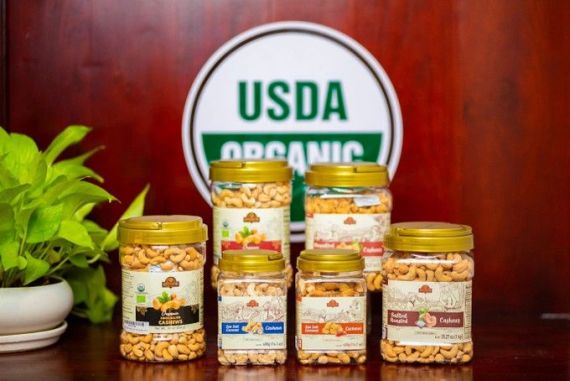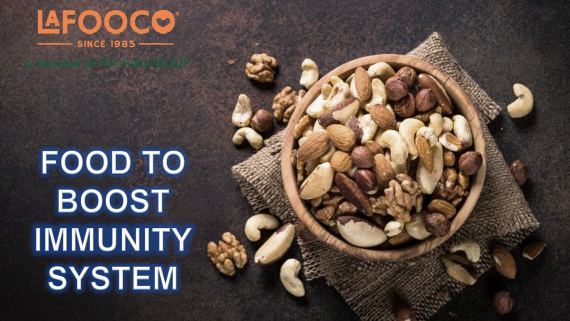8 kinds of the best nuts for health
 10/12/2020
10/12/2020
1/ Almonds: Almonds contain a number of beneficial nutrients. One serving - 28 grams or a small handful - contains approx
Calories: 161
Fat: 14 grams
Protein: 6 grams
Carbs: 6 grams
Fiber: 3.5 grams
Vitamin E: 37% of the recommended daily requirement (RDI)
Magnesium: 19% of the RDI
Almonds can help improve cholesterol levels. Several studies have found that eating a diet rich in almonds can lower "bad" LDL cholesterol, total cholesterol and oxidized LDL cholesterol, which are especially bad for heart health. circuit.
Almonds are used as part of a low-calorie diet that can help with weight loss and lower blood pressure in overweight or obese people.
Additionally, eating a meal with 28 grams of almonds can reduce the post-meal hyperglycemia by up to 30% in people with diabetes but not significantly in healthy people.
2 / Pistachios: Pistachios are a type of seed that is high in fiber. A 28-gram serving of pistachios contains about:
Calories: 156
Fat: 12.5 grams
Protein: 6 grams
Carbs: 8 grams
Fiber: 3 grams
Vitamin E: 3% of the RDI
Magnesium: 8% of the RDI
Pistachios can improve cholesterol levels, eating 2-3 ounces (56 - 84 grams) of pistachios per day can help increase "good" HDL cholesterol. Additionally, pistachios may help improve other cardiovascular disease risk factors, including blood pressure, weight and oxidation status; Help to reduce blood sugar after meals.
3/ Walnuts: Walnuts are a very popular nut and a great source of the omega-3 fatty acid alpha-linolenic acid (ALA). A 28-gram serving of walnuts contains about:
Calories: 182
Fat: 18 grams
Protein: 4 grams
Carbs: 4 grams
Fiber: 2 grams
Vitamin E: 1% of the RDI
Magnesium: 11% of the RDI
Several large studies have found that eating walnuts significantly lowers total and bad LDL cholesterol, while also increasing "good" HDL cholesterol levels.They may also help improve other factors involved. cardiovascular health, including blood pressure and normal blood flow through the body's circulatory system.
4. Cashew nuts:
Cashews are a nut tree, and one ounce (28 grams) of cashews contains about:
Calories: 155
Fat: 12 grams
Protein: 5 grams
Carbs: 9 grams
Fiber: 1 gram
Vitamin E: 1% of the RDI
Magnesium: 20% of the RDI
Another study found that cashews increased antioxidant capacity.
5. Pecans: One ounce (28 grams) of pecans contains about:
Calories: 193
Fat: 20 grams
Protein: 3 grams
Carbs: 4 grams
Fiber: 2.5 grams
Vitamin E: 2% of the RDI
Magnesium: 8% of the RDI.
Like other nuts, pecans also contain polyphenols, which are antioxidants.
6. Macadamia nuts: Macadamia nuts contain nutrients and are a source of healthy monounsaturated fats. One ounce (28 grams) contains about:
Calories: 200
Fat: 21 grams
Protein: 2 grams
Carbs: 4 grams
Fiber: 2.5 grams
Vitamin E: 1% of the RDI
Magnesium: 9% of the RDI
Many of the health benefits of macadamia nuts are linked to the health of the cardiovascular system. This may be due to the high content of monounsaturated fats. Several studies have shown that a diet rich in macadamia nuts can lower both total and bad LDL cholesterol in people with high cholesterol. Additionally, macadamia nuts may reduce other risk factors for cardiovascular disease including stress, oxidation, and inflammation.
7 / Hazelnuts: One ounce (28 grams) of hazelnuts contains about:
Calories: 176
Fat: 9 grams
Protein: 6 grams
Carbs: 6 grams
Fiber: 3.5 grams
Vitamin E: 37% of the RDI
Magnesium: 20% of the RDI
One study found that a hazelnut-rich diet reduced total cholesterol, LDL bad cholesterol and triglycerides. In addition, hazelnuts also work to reduce inflammation and improve blood vessel function.
8 / Peanuts
Peanuts are not classified as pods but belong to the legume family. One ounce (28 grams) of dry roasted peanuts contains about:
Calories: 176
Fat: 17 grams
Protein: 4 grams
Carbs: 5 grams
Fiber: 3 grams
Vitamin E: 21% of the RDI
Magnesium: 11% of the RDI
Peanuts may also improve cardiovascular disease risk factors. One study found that women who ate peanuts had a lower incidence of type 2 diabetes than those who did not.
Reference source: Healthlife.com











